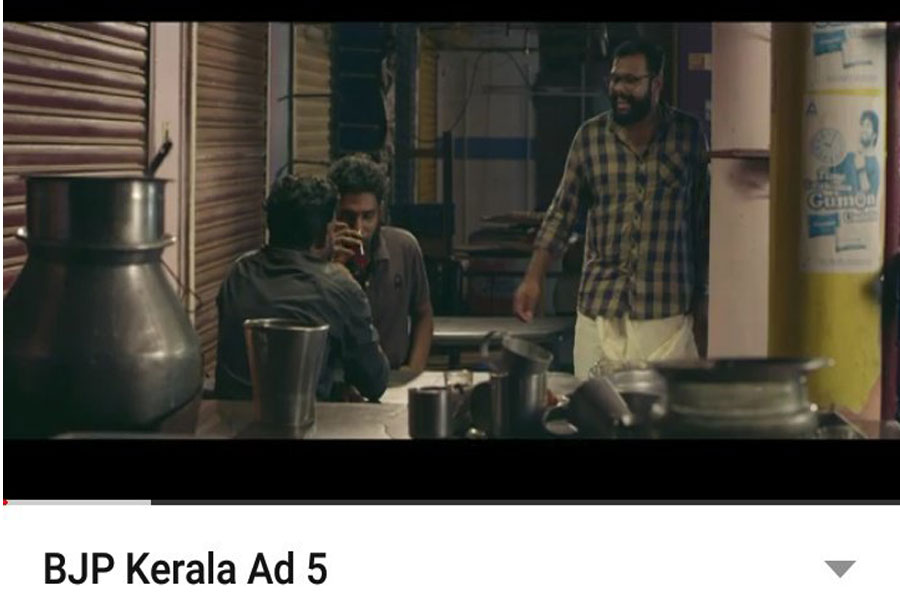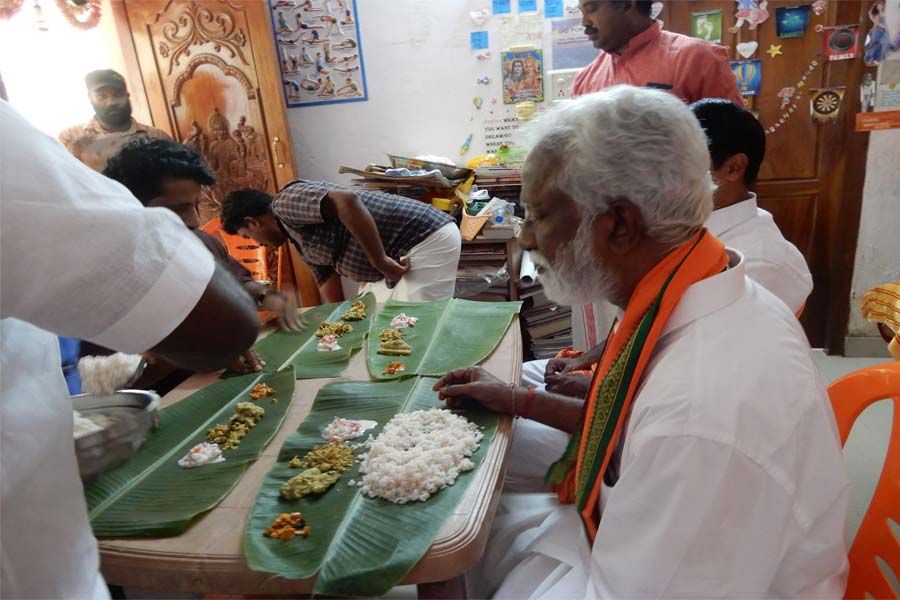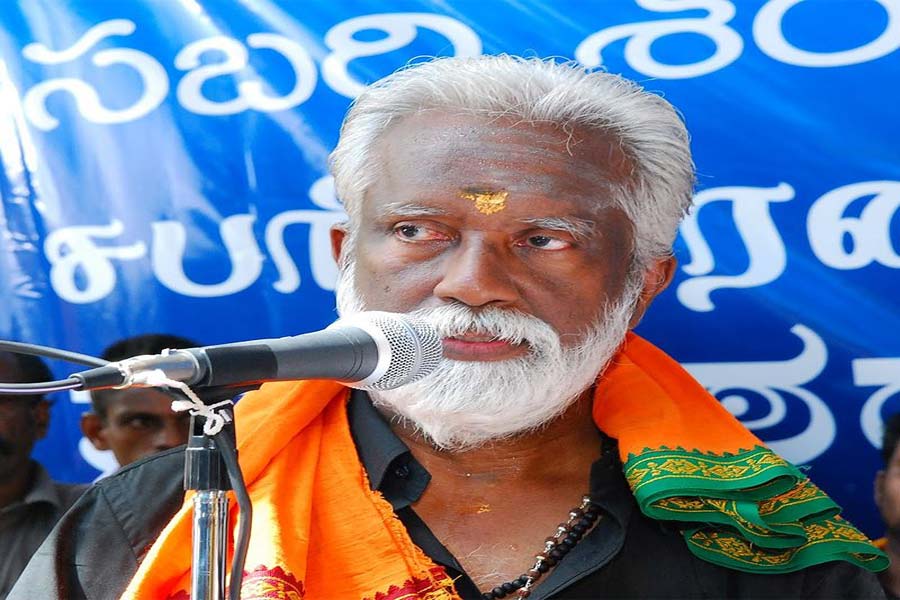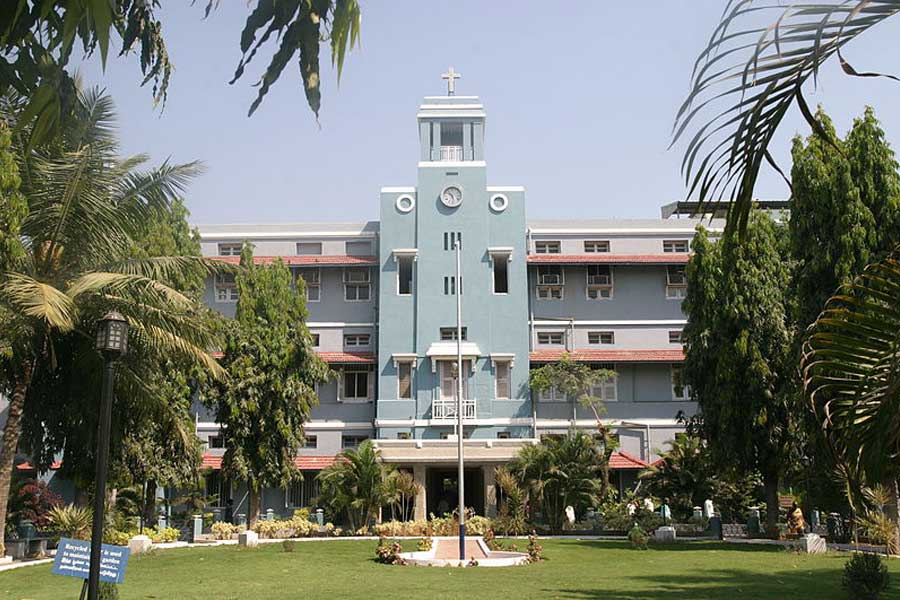Towards the fag end of the election campaign in Kerala, an advertisement sponsored by the Bharatiya Janata Party (BJP) played out on all channels. The fifth in a series of ads for the Kerala BJP, it had the familiar setting of a tea shop with a small group of youth talking politics. One of the young men is seen professing his newfound love for the BJP to his Modi-fied friend but seems unsure if he should go on and vote for the BJP. “Even if I were to vote for the BJP, would they win from Kerala?”
For a long time, many pro-BJP folks in Kerala have faced the same predicament. A vote for the BJP meant a waste of a vote as BJP candidates contested ritually for the third place. However, the 2016 assembly elections saw the contests becoming triangular in a dozen constituencies with the votes polled by the BJP (or their ally BDJS) deciding the winner and loser in many more seats. This was never the case earlier and it presaged a brighter future for the BJP after decades of toil.
 The final numbers for the National Democratic Alliance (NDA) in 2016, 15 per cent vote share and a solitary win, wasn’t substantial but it did make a difference to the way people looked at the saffron party in Kerala. A lot of hitherto silent supporters of the party began to come out of the closet to publicly declare their love for the Hindutva outfit.
The final numbers for the National Democratic Alliance (NDA) in 2016, 15 per cent vote share and a solitary win, wasn’t substantial but it did make a difference to the way people looked at the saffron party in Kerala. A lot of hitherto silent supporters of the party began to come out of the closet to publicly declare their love for the Hindutva outfit.
While, at the national level, the BJP goes all out on Hindutva nationalism and minority bashing, it takes a more tactical approach in Kerala. The communalism is neatly couched in all sorts of euphemisms and this tactic has slowly begun to appeal to the underlying prejudices of a section of the people.
A majority of Keralites had always taken for granted that the BJP was going to remain in the fringes. The peculiar demography, educational and social achievements, and a lot of other factors underscored this belief.
However, for the eagle-eyed, it seemed only a matter of time before the BJP made deep inroads. The tolerance and acceptance for others that one acquires through living in a multi-faith province and cosmopolitan setting aside, the fault lines were always visible to the observant types. This subtle communalism manifested in some of the movie scripts and drawing room conversations in many families but seldom found their way to the larger public discourse. But, for the really keen-eyed, it was just a matter of time before the BJP would break through.
Not everyone agrees though. “If the BJP were to lose power in the centre after this election, things will be back to normal. This is just a passing phase”, says author Paul Zacharia. He doesn’t think the BJP can consolidate “devotees” on the Sabarimala issue beyond a point.
Zacharia’s contention has some basis to it. Despite being around for many decades, the BJP had been unable to make a dent. Moreover, it has been devoid of popular leaders with mass appeal. It only existed in certain pockets before managing to create a base for itself in the capital city of Thiruvananthapuram with leaders imported all the way from Malabar and Kannur.
In many ways, it was the advent of 24/7 Malayalam news channels that gave the hitherto unfamiliar BJP leaders a platform and free coverage. News channels like Indiavision, Asianet News and Manorama News gave equal space to the BJP representatives on many national issues and even on debates pertaining to state politics.
A senior anchor with a news channel contents: “On a debate, we look for all sides of the opinion. On many national issues, it was required to get the BJP perspective as the primary opposition party at the centre through the United Progressive alliance (UPA) years. With a BJP government coming to power in Delhi, they became regular fixtures.”
Does he think they got unwarranted representation? “Well, it’s subjective. But these prime-time news channels did familiarise the names and faces of BJP leaders to a large section of Kerala’s population.”
A key challenge for the BJP is to gain credibility among the minorities. Here, minorities refer to the sizeable Christian population (18.5 per cent) and not the Muslims, whom they continue to demonize overtly and covertly to try and polarise Hindus. The efforts to woo Christians have been on for some time. What has given the BJP a bit of an impetus is the decision of splinter parties of the Syrian Christian-dominated Kerala Congress (KC), to join forces with them.
It is a fact that the Syrian Christians (or Saint Thomas Christians) are generally not as antagonistic to the BJP as much as the Latin Christians on account of their classist moorings. The Syrian Christians dearly hold on to their belief that they are Brahmin converts baptized by Saint Thomas and this casteist attitude gets manifested in many ways.
While the BJP has traditionally been at loggerheads with the Christian community in Kerala—the Nilackal agitation in the eighties being a major stand-off—it has come around to the conclusion that only the active appeasement of Christians in general and Syrian Christians in particular would help them reach the critical mass required to start winning.
Just last week, there were reports that the BJP would form a collective for the “protection” of Christians in the state following the church blasts in Sri Lanka. The forum is being sought to be established under the minority wing of the party headed by Noble Mathew, coincidentally, a former Kerala Congress (KC) politician, who joined the BJP recently after allying with the NDA with his splinter outfit earlier.
The launch on May 29, the 40th day of the Church bombings, will be held at the Mother Teresa square in Kochi with a day-long fast. The 40th day has been chosen carefully as the Christians believe the dead begin their heavenly journey on the 40th day in accordance with the heavenly ascension of Jesus Christ.

The exit polls don’t predict major success for the BJP in Kerala, except in Thiruvananthapuram where Kummanam Rajasekharan is seen to be locked in a close contest with Shashi Tharoor, and Pathanamthitta, where BJP’s Sabarimala poster boy K Surendran is expected to finish runner-up. BJP is also expected to finish a close third with decent vote shares in Trissur and Palakkad.
In fact, T N Prathapan, the Congress candidate from Trissur, made news recently for his straight talk at a Congress stock-taking meet that it wouldn’t come as a shock to him if the BJP candidate Suresh Gopi effectively killed his chances. Although it was dismissed as a panicky reaction, many analysts expect Suresh Gopi to do well. Whether Gopi would go on to win remains to be seen but BJP has historically never been in contention to win in Kerala as it finds itself today.
There are different views on which of the two fronts—the Congress-led United Democratic Front (UDF) or the Communist Party of India (Marxist)-led Left Democratic Front (LDF)—will be affected more by BJP’s march. A prominent Marxist party leader admitted to The Kochi Post that the Sabarimala issue is likely to see an erosion of the LDF’s Hindu vote base but he went on to claim that the UDF’s Hindu vote base is always likely to make that switch first to the BJP as a more ritualistic and religious community per se.
Whatever the result, BJP is definitely on the ascendant in Kerala and the faith-revivalism among all communities has added to it. There is no point in denying it anymore.







